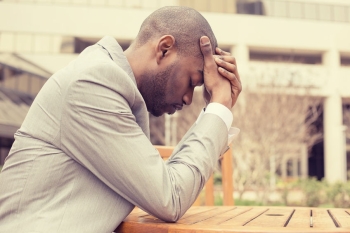
One of the first emotions people think about when a relationship ends is sadness. A loss has occurred and most people expect to feel sad for a short period of time. However, many times that sadness may stick around and cause a person to feel depressed a lot of the time. This type of depression is not “the blues”. All of us will feel “the blues” from time to time for a variety of reasons but we manage to live our lives relatively normally. When you are feeling depressed, it can be hard to motivate yourself to do anything, even very simple tasks. Some mornings getting out of bed can be a huge effort. While you may not be able to make your depressed feelings go away as quickly as you would like, there are some techniques to help you cope with them.
Try to make sure that you are eating and sleeping as well as you can. Feeling depressed can affect both your sleeping and eating patterns. Eating well and getting regular sleep will physiologically help your body to function and will help you to feel the best that you can. In fact, a lack of proper nutrition and/or lack of sleep can actually cause you to feel depressed. Regular cardio exercise also is very helpful in reducing depression. When your body is in balance physiologically, you feel your best both physically and emotionally.
When you are feeling depressed if often seems like there are a million things to do. Make a list of small goals and complete one each day. For example, do the dishes. If you feel like you can do another goal on the list that’s fine, but don’t pressure yourself to do more than one. Don’t be afraid to ask for help if you need it. Having small goals and keeping in mind that you aren’t yourself and won’t be able to accomplish as much as usual is very important. In the beginning (which can last for a few years, especially if you are now a single parent or if this was your first love relationship), you may need to really on friends and family. That is normal so don’t be afraid to ask for help. Trust that your family and friends are capable of setting their own boundaries around assisting you. Your job is to ask and it is their job to decide if they need to say no.
When you are depressed, it is often hard to find pleasure in any of the activities that you used to enjoy. The last thing that you may want to do or think you can do is to try and do those activities. Doing activities that you previously enjoyed can help you to move forward and you may even find you do feel some enjoyment. Remember it’s normal not to be excited by the activities. Sometimes this lack of enjoyment can last for up to one year. That is ok. Your job is simply to re-engage in life. Enjoying life may take some time. In the meantime, try not to isolate yourself. Spending time by yourself is not bad sometimes, but if it becomes a regular activity it can make your depression worse. Try to spend time with family and friends, even if you don’t feel like it. If you feel like you have no friends, then it’s even more important that you reach out to others. This is a time in your life where you will need others the most.
Like anxiety, depression is characterized by a lot of negative thinking. Journaling to get some of those depressed thoughts out can help you feel a bit better. To start working your way through your depression, challenging this negative thinking can be very helpful. For more information about challenging negative thinking, read this tip: http://www.sextherapyinphiladelphia.com/changing_negative_thinking.htm In addition, try to list any positives that you can think of in your life and about yourself and write them on index cards. Read through your index cards on a regular basis.
Coping with depression is very important, but no coping skill will make your depression magically disappear. They will, however, make it easier to manage your depression and help you to have times that you feel better. You may feel sad and depressed for a few months or even longer as you move through the transition of the end of your relationship. It is part of the process and it will end. You can’t make yourself feel happy, but remember you will not feel this way forever and you will be able to function and feel like yourself again. It may seem intolerable, but you can deal with it and you will get through it.
Sometimes, feeling depressed can cause suicidal thoughts. While it is not necessarily uncommon to think about suicide when you are feeling depressed, if these thoughts become overwhelming and constant and/or you have a plan to kill yourself, seek help right away by reaching out to someone in your life, seeing a therapist, calling a crisis hotline, or if you are in immediate danger, going to your local emergency room. No matter how bad things may be or seem, there is always hope for the future. In addition, if you feel like you need more support for dealing with your depression or it is lasting longer than you would like, even if you do not have suicidal thoughts, consider seeing a therapist. You may not be able to make the depressed feelings go away, but you can learn how to cope with them.

























